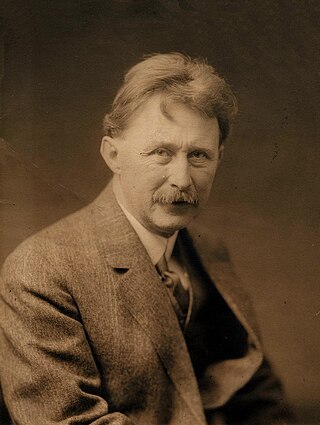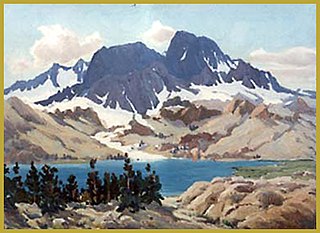
Edgar Alwin Payne was an American painter. He was known as a Western landscape painter and muralist.

The Laguna Art Museum (LAM) is a museum located in Laguna Beach, California, on Pacific Coast Highway. LAM exclusively features California art and is the oldest cultural institution in the area. It has been known as the Laguna Beach Art Association, as well as the Laguna Beach Museum of Art.

Joseph Kleitsch was a Hungarian-American portrait and plein air painter who holds a high place in the early California School of Impressionism.

Maurice Braun (1877–1941) was an American artist who became known for his Impressionist landscapes of Southern California. He was born in Hungary on October 1, 1877; however, by the age of four, young Maurice and the Braun family had migrated to United States, and settled in New York City. His professional studies took him to the National Academy of Design, where he studied the French tradition under Francis C. Jones, George W. Maynard and Edgar M. Ward.

Franz Albert Bischoff was an American artist known primarily for his China painting, floral paintings and California landscapes. He was born in Steinschönau, Austria. He immigrated to the United States as a teenager where he became a naturalized citizen. While in Europe, his early training was focused upon applied design, watercolor and ceramic decorations.
Arthur Hill Gilbert was an American Impressionist painter, notable as one of the practitioners of the California-style. Today, he is remembered for his large, colorful canvases depicting meadows and groves of trees along the state's famed 17 Mile Drive. Gilbert was part of the group of American impressionist artists who lived and painted in the artists' colony scene in California at Carmel and Laguna Beach during the 1920s and 1930s.
The California Art Club (CAC) is one of the oldest and most active arts organizations in California. Founded in December 1909, it celebrated its centennial in 2009 and into the spring of 2010. The California Art Club originally evolved out of The Painters Club of Los Angeles, a short-lived group that lasted from 1906–09. The new organization was more inclusive, as it accepted women, sculptors and out-of-state artists.

Theodore Nikolai Lukits was a Romanian American portrait and landscape painter. His initial fame came from his portraits of glamorous actresses of the silent film era, but since his death, his Asian-inspired works, figures drawn from Hispanic California and pastel landscapes have received greater attention.

Colin Campbell Cooper, Jr. was an American impressionist painter of architectural paintings, especially of skyscrapers in New York City, Philadelphia, and Chicago. An avid traveler, he was also known for his paintings of European and Asian landmarks, as well as natural landscapes, portraits, florals, and interiors. In addition to being a painter, he was also a teacher and writer. His first wife, Emma Lampert Cooper, was also a highly regarded painter.

George Gardner Symons (1861-1930) was an American impressionist painter.

The terms California Impressionism and California Plein-Air Painting describe the large movement of 20th century artists who worked out of doors, directly from nature in California, United States. Their work became popular in the San Francisco Bay Area and Southern California in the first three decades after the turn of the 20th century. Considered to be a regional variation on American Impressionism, the California Impressionists are a subset of the California Plein-Air School.

Victor Stanley Matson (1895–1972) was an American artist representative of the California Plein-Air school of painting. He was active from the 1920s until his death. An active organizer for several Southern California arts organizations, he served as president of the historic California Art Club from 1961 to 1962. His work was widely exhibited with the Southland art clubs in an era when few galleries were interested in Plein-Air landscapes and he had a solo exhibition at Los Angeles City Hall in 1964.
California Tonalism was art movement that existed in California from circa 1890 to 1920. Tonalist are usually intimate works, painted with a limited palette. Tonalist paintings are softly expressive, suggestive rather than detailed, often depicting the landscape at twilight or evening, when there is an absence of contrast. Tonalist paintings could also be figurative, but in them, the figure was usually out of doors or in an interior in a low-key setting with little detail.

Richard D. (Dick) Keyes was an American painter associated with abstract expressionism, impressionist landscapes and the California Plein-Air Painting revival. Keyes was a Professor Emeritus at Long Beach City College, where he taught life drawing and painting for 30 years, between 1961 and 1991. He continued to teach, lecture and demonstrate throughout his retirement, with groups such as the Huntington Beach Art League.

Anna Althea Hills was an American plein air painter who specialized in impressionist landscapes of the Southern California coast.
Frank William Cuprien was an American plein-air painter of the California impressionism movement, noted for marine scenes and opalescent seascapes. As a leading member of the Laguna Beach, California art colony, Cuprien became known as the "Dean of Laguna Artists."
Alfred R. Mitchell (1888-1972) was an American landscape painter. He was an early California Impressionist painter. Educated at the Pennsylvania Academy of Fine Arts, he was the president of the San Diego Art Guild and the La Jolla Art Association. He became known as the "Dean of San Diego County artists".
Jean Stern, Director Emeritus of The Irvine Museum is an art historian and retired museum director who specializes in paintings of the California Impressionist period (1890-1930).

Thomas Lorraine Hunt was a Canadian-American landscape painter of the 1920s and 30s, known especially for his dramatic use of color. His paintings are considered a transition from impressionism to modernism. His primary subjects were boats and harbors in which the colors and shapes on the canvas took precedence over the exactness of the objects. Hunt was active among the Southern California group of Impressionist plein air painters and a founding member of the Laguna Art Museum.
Clarence Keiser Hinkle, was an American painter and art educator. His art studio was in Laguna Beach, California, and later in Santa Barbara, California. He was known for his still life and portrait paintings.














